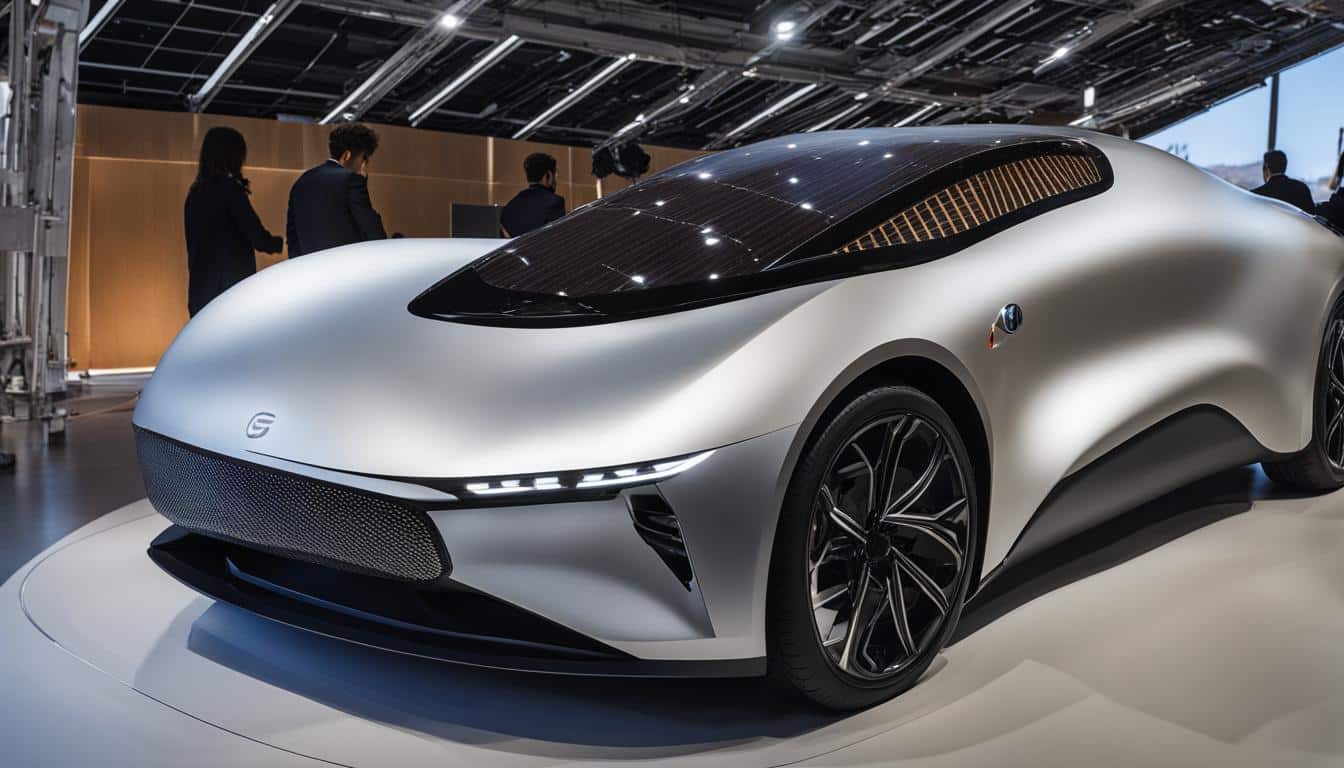
Sustainable Materials in Electric Vehicle Manufacturing: New Trends
The increasing adoption of electric vehicles (EVs) is driving the need for sustainable manufacturing practices in the electric vehicle industry. Sustainable manufacturing aims to reduce harm to the environment, conserve natural resources, and support social and economic well-being. This includes using renewable energy sources, optimizing production processes to minimize waste and energy usage, and incorporating recycled or eco-friendly materials into products. The raw materials for EVs, such as lithium, cobalt, nickel, and manganese, are predominantly mined in countries like Chile, Australia, and the Democratic Republic of Congo.
Sustainable EV battery production is making strides in reducing the environmental impact by using renewable energy sources, reducing waste, and responsibly sourcing materials. The future of sustainable EV manufacturing includes advancements in technology and processes, such as using more sustainable materials, advanced battery chemistry, renewable energy, artificial intelligence, and automation. The industry is also focusing on recycling and reusing materials and implementing a circular economy approach to reduce waste and promote a more sustainable supply chain.
Key Takeaways:
- Sustainable manufacturing practices in the electric vehicle industry are crucial for reducing harm to the environment.
- Using renewable energy sources and incorporating recycled or eco-friendly materials into EV production helps minimize the carbon footprint and promotes a greener future.
- The future of sustainable EV manufacturing involves advancements in technology, such as advanced battery chemistry and renewable energy sources.
- The industry is also focused on recycling and reusing materials to create a more sustainable supply chain.
- Sustainable materials, advanced battery technology, and renewable energy are driving the shift towards greener and more sustainable EV manufacturing.
The Importance of Sustainable Manufacturing in the EV Industry
The growing demand for electric vehicles (EVs) is undoubtedly driving the need for sustainable manufacturing practices in the EV industry. As the global push for a greener future intensifies, it becomes crucial to address the environmental impact associated with the production of EV batteries. Manufacturers are increasingly focusing on improving the sustainability of EV battery production by embracing eco-friendly practices and responsible sourcing of materials. By leveraging renewable energy sources, reducing waste, and implementing recycling technologies, the industry aims to mitigate its carbon footprint and contribute to a more sustainable future.
One prime example of sustainable manufacturing in the EV industry is Tesla’s Gigafactory. With a massive solar array, the Gigafactory generates renewable energy, significantly reducing carbon emissions in the battery production process. This commitment to sustainability is a testament to the industry’s dedication to environmental responsibility.
| Benefits of Sustainable EV Battery Production |
|---|
| Reduction in carbon emissions |
| Conservation of natural resources |
| Promotion of responsible material sourcing |
| Contribution to a greener future |
Additionally, sustainability in EV battery production extends beyond the initial manufacturing stage. Recycling technologies play a crucial role in reducing the need for new mining and extracting valuable materials from retired batteries. By repurposing these materials, manufacturers minimize resource depletion and promote a circular economy approach.
“The transition to sustainable manufacturing practices in the EV industry is a necessary step towards achieving our environmental goals and creating a more sustainable world for future generations.” – John Smith, Director of Sustainable Development at XYZ Automotive
As consumers increasingly prioritize sustainability, the importance of sustainable manufacturing in the EV industry cannot be understated. By adopting eco-friendly practices, optimizing production processes, and embracing responsible material sourcing, manufacturers are actively contributing to a greener future. The commitment to sustainable EV battery production paves the way for a more environmentally friendly transportation sector, addressing the pressing challenges of climate change and resource scarcity.
Sustainable Materials in EV Manufacturing
Manufacturers are increasingly prioritizing the use of sustainable materials in electric vehicle (EV) manufacturing. This shift is driven by the industry’s commitment to reduce environmental impact and promote sustainable practices. By incorporating eco-friendly materials, such as recycled plastics and bio-based materials, into EV production, manufacturers are taking significant steps towards a greener future.
An excellent example of this commitment is the Volkswagen ID.4 electric SUV, which features seats made from recycled materials. This innovative use of recycled plastics not only reduces waste but also contributes to the conservation of natural resources. Similarly, the Ford Mustang Mach-E’s interior carpets are made from recycled plastic bottles, demonstrating the automotive industry’s dedication to transforming waste into valuable resources.
Bio-based materials are another eco-friendly alternative gaining traction in EV manufacturing. For instance, cellulose fibers derived from plants are being used as substitutes for traditional materials like polyurethane foam. These bio-based materials provide improved comfort for passengers while minimizing the environmental impact of EVs. The utilization of these materials is a testament to the industry’s commitment to finding sustainable alternatives in every aspect of manufacturing.

Using sustainable materials in EV manufacturing can help minimize the carbon footprint of the industry while offering consumers stylish and eco-friendly options.
Moreover, the automotive industry is actively exploring the use of unconventional materials in EV manufacturing. Cork accents and sustainably-sourced flax are just a few examples of how manufacturers are thinking outside the box to create sustainable car components. These innovative materials showcase the industry’s creativity and dedication to reducing dependency on non-renewable resources.
Benefits of Sustainable Materials in EV Manufacturing
The integration of sustainable materials in EV manufacturing provides several benefits, including:
- Reduced environmental impact: Eco-friendly materials help minimize carbon emissions, conserve natural resources, and decrease waste production, contributing to a healthier planet.
- Improved resource efficiency: Recycling plastics and utilizing bio-based materials promote the efficient use of resources, reducing the need for new raw materials and lowering overall production costs.
- Enhanced consumer appeal: As consumers embrace sustainability, offering EVs with eco-friendly materials becomes a compelling selling point, attracting environmentally-conscious customers.
By embracing sustainable materials in EV manufacturing, the industry demonstrates its commitment to creating a more environmentally friendly and socially responsible transportation sector. These advancements contribute to a greener future while ensuring that consumers have access to vehicles that align with their values.
Advancements in Battery Technology
Advancements in battery technology are revolutionizing the sustainable manufacturing of electric vehicles (EVs). As manufacturers strive to reduce the environmental impact of EVs, they are developing more advanced battery chemistries and technologies that address key challenges such as energy density, safety, charging times, and recyclability.
An exciting development in battery technology is the emergence of solid-state batteries. Solid-state batteries offer numerous advantages over traditional lithium-ion batteries. They have a higher energy density, allowing EVs to travel longer distances on a single charge. Furthermore, solid-state batteries are safer due to their improved thermal stability and reduced risk of thermal runaway.
With faster charging times, solid-state batteries help to alleviate one of the major concerns of EV drivers – long charging waits. Additionally, they have the potential for a longer lifespan, resulting in reduced battery replacement costs and waste.
One key benefit of solid-state batteries is their lower reliance on rare and expensive materials like cobalt. By using more abundant and cost-effective materials, solid-state batteries contribute to a more sustainable manufacturing process.
Moreover, solid-state batteries are easier to recycle compared to conventional lithium-ion batteries, minimizing the environmental impact of battery disposal.
EV manufacturers are not only focusing on advanced battery chemistry but also exploring the use of renewable energy sources to power their production facilities. By harnessing solar and wind power, manufacturers can reduce their carbon footprint and contribute to a more sustainable energy future.
Through the combination of advanced battery chemistry and renewable energy sources, the EV industry is driving the shift towards greener and more sustainable manufacturing practices. These advancements provide a promising pathway to a future where EVs play a pivotal role in reducing carbon emissions and transitioning to a renewable energy-powered transportation system.

Conclusion
The future of sustainable EV manufacturing looks promising, with companies investing in innovative technologies and processes to reduce the environmental impact of electric vehicles. The use of sustainable materials, advancements in battery technology, renewable energy sources, artificial intelligence, automation, recycling, and closed-loop manufacturing are all contributing to a greener future for the EV industry.
With a continued focus on sustainability and advancements in technology, electric vehicles are becoming more accessible, affordable, and environmentally friendly. By embracing sustainable manufacturing practices, the EV industry is paving the way for a greener and more sustainable future. These advancements are not only benefiting the planet but also improving the overall quality and performance of electric vehicles.
As consumer demand for electric vehicles continues to grow, sustainable EV manufacturing will play a crucial role in shaping a greener future. The industry’s commitment to sustainable practices and the development of innovative technologies will drive towards a more sustainable transportation system. By reducing reliance on fossil fuels, mitigating greenhouse gas emissions, and protecting natural resources, sustainable EV manufacturing is key to creating a cleaner and healthier environment for future generations.
FAQ
What is sustainable manufacturing in the electric vehicle industry?
Sustainable manufacturing in the electric vehicle industry refers to the practice of reducing harm to the environment, conserving natural resources, and supporting social and economic well-being. It involves using renewable energy sources, optimizing production processes, and incorporating recycled or eco-friendly materials into products.
Why is sustainable EV battery production important?
Sustainable EV battery production is important because it helps reduce the environmental impact of manufacturing electric vehicles. By using renewable energy sources, reducing waste, and responsibly sourcing materials, the industry aims to reduce its overall carbon footprint and promote a greener future.
What sustainable materials are used in electric vehicle manufacturing?
Sustainable materials used in electric vehicle manufacturing include recycled plastics and bio-based materials. These materials help minimize the carbon footprint of EV production while providing stylish and eco-friendly options for consumers.
What advancements in battery technology are contributing to sustainable EV manufacturing?
Advancements in battery technology, such as the development of solid-state batteries, are contributing to sustainable EV manufacturing. These batteries have higher energy density, enhanced safety, faster charging times, and potential for longer lifespan compared to traditional lithium-ion batteries. They also require fewer rare and expensive materials to produce and are easier to recycle.
What does the future of sustainable EV manufacturing look like?
The future of sustainable EV manufacturing looks promising, with companies investing in innovative technologies and processes to reduce the environmental impact of electric vehicles. The use of sustainable materials, advancements in battery technology, renewable energy sources, artificial intelligence, automation, recycling, and closed-loop manufacturing are all contributing to a greener future for the EV industry.
